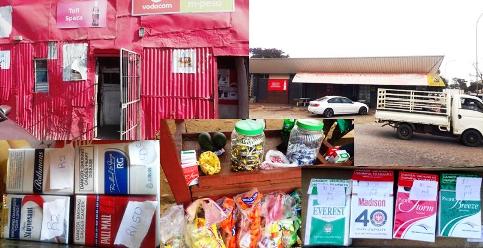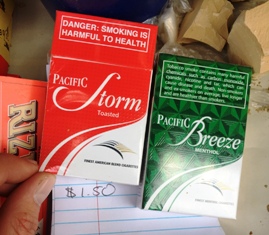African Cigarette Prices Data Project

During the June/July 2019 university holidays, about 40 UCT students from ten African countries collected tobacco prices in their hometowns as part of the African Cigarette Prices (ACP) Project. Senzo Mthembu, who joined REEP earlier this year, and who was a fieldworker while he was still a student, is the fieldwork coordinator of this project. Senzo takes over from Kirsten van der Zee, who was the founding coordinator in 2016. He gave us some insights into what happens in-field, and behind the scenes.
The aim of the ACP project is to collect cigarette prices across a variety of African countries. Amongst other things, the data enables researchers to estimate price differences across various brands, urban/rural divides, types of packaging, and price trends over time. “Before each major holiday (i.e. June/July and December/January) we recruit fieldworkers from registered UCT students – specifically African students who spend their vacations in African countries (outside of SA), or in South African townships or rural areas,” Senzo says. “We provide them with thorough training on how to collect and record the data, and provide them with the necessary documentation.”
Fieldworkers are required to visit retail outlets, spaza shops and street vendors in their hometowns where cigarettes are sold. There they must first request permission from the owner/manager to undertake the data collection. If permission is given, fieldworkers record the prices of as many cigarettes as possible, and take photographs of all recorded prices using their smartphones. Fieldworkers then capture this price information, as well as other information such as the brand and sub-brand of the cigarette, the date and the type of outlet, etc. in an Excel spreadsheet. The data from all fieldworkers is then combined by the fieldwork coordinator, and is cleaned for analysis. The coordinator also checks for any potential fraud by the fieldworkers. Fieldworkers are paid piece-meal.

Table 1: Prices Collected and Fieldworkers by Round
| Round | Number of observations | Number of fieldworkers | Number of countries |
| 1 (Jan. 2016) | 1025 | 6 | 5 |
| 2 (July 2016) | 9 299 | 28 | 7 |
| 3 (Jan. 2017) | 7 772 | 8 | 5 |
| 4 (July 2017) | 10 935 | 23 | 7 |
| 5 (Jan. 2018) | 22 187 | 38 | 8 |
| 6 (July 2018) | 23 147 | 34 | 8 |
| 7 (Jan. 2019) | 18 795 | 36 | 10 |

While the prices are not nationally representative, it is a cheap way to get an understanding of the range of prices and the distribution of brands in a number of African countries. Also, for the fieldworkers, this is a handy source of extra income. Through this project students are made aware of REEP and the economics of tobacco control, which has attracted some to continue their research work in this area.
“As the database is growing, it allows us to do interesting analyses with the data,” Senzo says. “We encourage students and researchers to use this data for their research.”
Recently, the ACP data came in very handy when the team was approached by the World Bank to do a comparative analysis of prices of tobacco and alcohol between Gaborone (in Botswana) and South African towns across the border. Because of a special levy, the prices of tobacco and alcohol in Botswana are much higher than in South Africa. Senzo explains: “With this data we were able to quantify this price difference and determine whether there are very cheap products in either countries.” He continues: “We found that many cigarettes in South Africa were sold at very low prices, indicating an illicit trade problem, but that there was no evidence of very cheap cigarettes in South Africa.”
The World Bank used these findings to support the government of Lesotho in implementing a similar levy on cigarettes. With the data from the ACP Project, the World Bank was able to show that, with proper border controls in place, imposing an additional levy on cigarettes in Lesotho would not result in an increase in illicit trade.
The results of this research have subsequently been included in a chapter in the World Bank report: “Confronting Illicit Tobacco Trade: A Global Review of Country Experiences.”
Read the DataFirst report here: https://www.datafirst.uct.ac.za/dataportal/index.php/catalog/582/study-description
